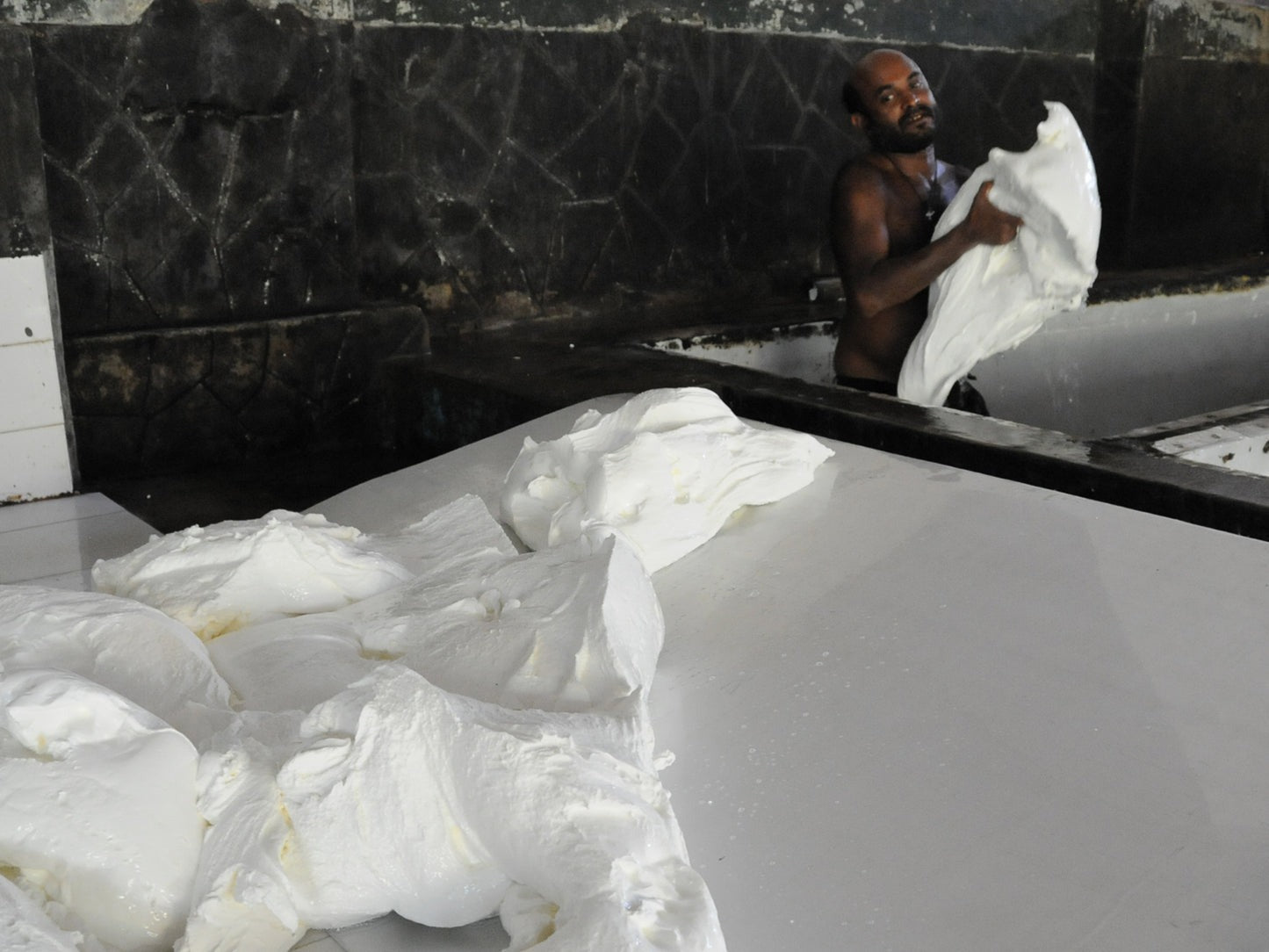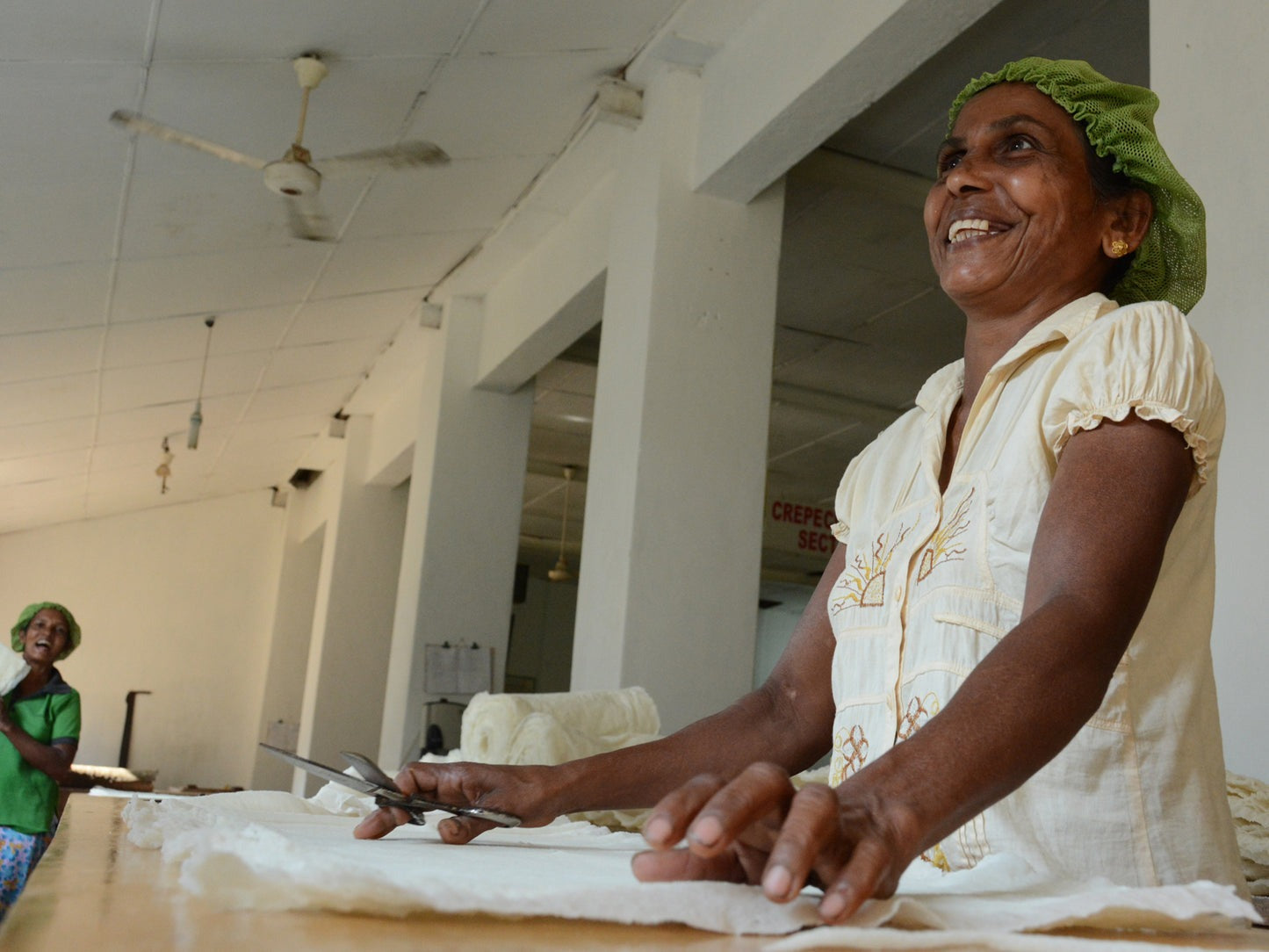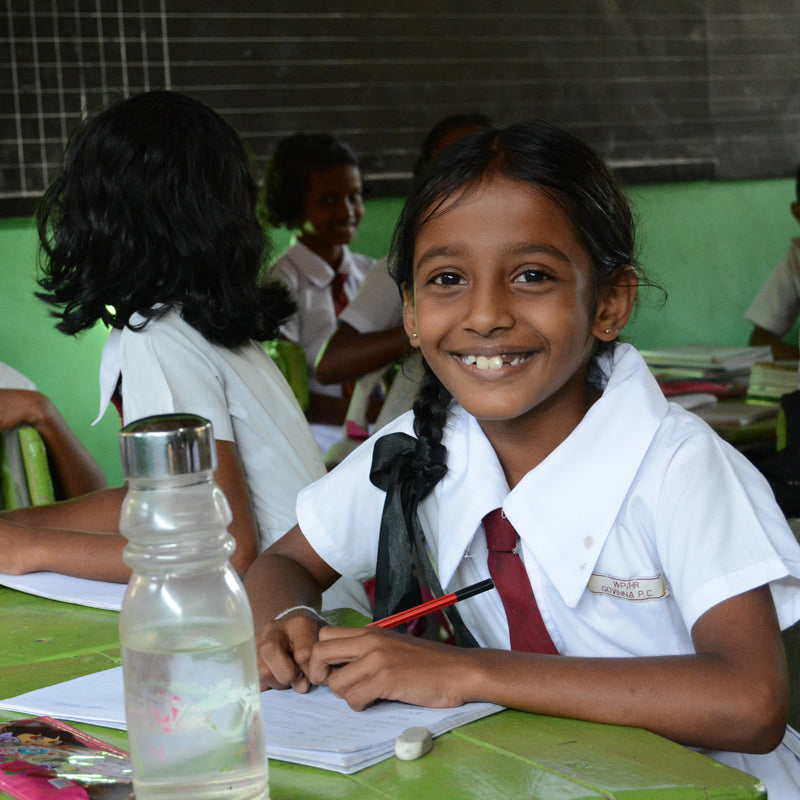About Fairly Traded Rubber

Here at Plastic Free Gardening, we’re proud members of the Fair Rubber Association and often get asked why we use rubber as our principal material for our products. We thought we’d compile this info as a kind of Rubber FAQ to help answer all of your questions.
What is rubber?
So, what is rubber? Rubber is a natural product produced by plants and is present in many goods used in our daily lives. Rubber has had an essential role in human history throughout the development of human civilizations. It still plays an important role, so we need to search for new rubber sources.
Where does rubber come from?
Nowadays, 99% of the natural rubber we use is extracted from a tree called Hevea brasiliensis. PFG sources all of its natural rubber solely from small scale farmers in Sri Lanka, whose plantations are certified not to have replaced natural forests. Ensuring they get a Fair Trade price for all the rubber they produce helps them sustainably build a business that can help support their own family and many families in the area.
What is natural rubber?
Natural rubber is produced from plants and is classified as a polymer. Polymer is a chemical compound with large molecules made of many smaller molecules of the same kind. Some polymers exist naturally, and others are produced in laboratories and factories.
Natural rubber is one of the most essential polymers for human society. Natural rubber is a necessary raw material used to create more than 40,000 products. It is used in medical devices, surgical gloves, aircraft and car tires, pacifiers, clothes, toys, etc. Natural rubber is obtained from latex, a milky liquid present in either the latex vessels (ducts) or in the cells of rubber-producing plants. Around 20,000 species of plants produce latex, but only 2,500 species have been found to contain rubber in their latex. The biological function of rubber for the plants is not fully known. However, it has been shown that rubber can help plants heal after they are damaged by covering wounds and stopping the bleeding. This blocks the entry of harmful bacteria and viruses into the plants.
The properties of rubber include high strength and the capability to be stretched many times without breaking. Natural rubber compounds are exceptionally flexible, good electrical insulators, and are resistant to many corrosive substances.
Synthetic (man-made) rubber can be produced through a chemical process, but people have not been able to create a synthetic rubber with all the natural rubber properties. So, natural rubber cannot be replaced by synthetic rubber in most of its applications. Therefore natural rubber is still essential to human society.
Is natural rubber expensive?
The answer to this question is never easy, as when and should you consider the cost to the natural environment? Natural rubber trees are ‘tapped’ by small farmers or plantation workers, in theory providing an essential source of revenue. However, currently, the price for natural rubber does not even cover the cost of productions. But because we are members of the Fair Rubber Association, we pay our primary suppliers a Fair Trade premium of EUR 0.50 kg/DRC (Dry Rubber Content) - at present, almost 40% above world market prices. This helps improve the working and living conditions of the primary producers and ensures environmentally friendly, sustainable production. Our primary source for natural rubber is also FSC certified.
The price difference between natural rubber, which has a higher price, and synthetic rubber is due to both demand-side factors, use and production and supply-side factors, including the costs of raw materials and agricultural constraints. However, the price of rubber is primarily affected by supply-side factors, causing a lot of volatility, particularly in natural rubber. The Fair Rubber Association is trying to help promote the importance of paying a Fair Trade price for natural rubber to ensure small suppliers can sustainably supply natural rubber.

Fairly Traded rubber
Here at Plastic Free Gardening (PFG), we source rubber from natural FSC certified small suppliers whose rubber plantations have not replaced natural forests. As the Fair Rubber Association members, PFG also pay a premium Fair Trade price – currently 40% over world market prices. Thus ensuring the continued improvement of the producers' working and living conditions and keeping the production as sustainable and environmentally friendly as possible.
But what is Fairly Traded rubber?
Fairly Traded rubber is the responsibility of the Fair Rubber Association. They aim to expand and apply the concept of Fair Trade for products made from natural rubber. In the Fair Rubber Association, companies engaged in rubber products, Non-Governmental Organisations (NGOs), and individuals work together. The ultimate aim of the Association is to thereby contribute to an improvement of the working and living conditions of the primary producers of natural latex (rubber), as well as promote the environmentally friendly production of natural rubber, as chemical-free production first and foremost benefits those engaged in the cultivation of the natural rubber. The essential instrument of Fair Rubber is the Fair Rubber logo for products that fulfil Fairtrade criteria in natural rubber.
Like us at Plastic Free Gardening, member companies, paying a Fair Trade premium is a fundamental commitment. The Fair Rubber Association monitors both the transfer of funds and the decision on what Fair Trade premiums are used. The decisive principle here is that the rubber producers can decide how to use the additional income. Independent auditing firms control adherence to the Fair Rubber criteria – whereby (unlike most other 'labels') the Fair Rubber Association pays the costs for these audits: As we cannot guarantee whether/how many orders and thus Fair Trade payments go to a producer partner, we want to make sure that participation in Fair Trade does not lead to extra costs for disadvantaged producers.
This commitment to Fair Trade prices is now more critical than ever. The low world market price paid for rubber and bad working conditions makes it very difficult for the tappers, plantation workers, and small farmers to support themselves and their families with their labour. This is where the Fair Rubber Association and its member companies want to help. Paying a Fair Trade premium to the primary producers ensures to the extent possible that even during periods of depressed world market prices, the costs of production are covered, and the suppliers have a surplus. Crucially this allows them to improve their working and living conditions. Of course, the decision as to how they would spend the Fair Trade premium remains with the primary producers.
Unlike the plastics industry, which is controlled by a few massive multinationals, natural rubber is an entirely sustainable product grown by small farmers or on plantations. Plastic Free Gardening sources only from suppliers whose plantations are certified not to replace natural forests. Due to the current low price of natural rubber, many rubber plantings are threatened from conversion to palm oil or beef production. So when you buy our seed trays, you ensure the survival of a valuable, natural resource.

Fair Trade Natural Rubber makes life a little easier for three generations of women.
For 11 year old Budini little is as important as dancing. Classical dancing has a long tradition in Sri Lanka, you tell stories through dance. Budini studies dance at school but during the holidays she’s also allowed to take some private tuition which is one of the few luxuries in her life.
Budini, her younger sister, her mother and her grandmother live on the rubber plantation Horana. She was five when her father signed his first work contract with a clothing manufacturer in Mauritius, 4000 km or a five and a half hour flight away from Sri Lanka. The agent who got him the contract took more than a month’s wages as a commission but since then Dinesh Kumar can regularly send money home to his family. As a rubber tapper in Horana he would make a lot less and that is why he signed another 5-year contract last year. But he can only afford to visit his family once a year and when she and her sister have to say good-bye at the airport they always cry a lot, says Budini. For the rest of the year they have to make do with the 15 minute phone call her Dad makes every Sunday.
Budini’s mother not only looks after the household, until recently she had to take care of her wheelchair bound 85-year old mother and a relative in the late stages of throat cancer. Both died last year.
Budini and her family live in a small house not far from the rubber factory in Horana. There the freshly collected latex milk is coagulated and pressed into crepe. The long, delicate crepe sheets have to be checked for impurities which then have to be carefully cut out. This work takes concentration and experience. Budini’s grandmother has lots of both; 52-year old Premavati has been working at the factory for more than 30 years.
A small part of the rubber that is produced at Horana is sold under Fair Trade conditions. The joint body, a committee elected by the plantation workers decides what the Fair Trade premium will be spent on. It took not much time to agree: a communal space was desperately need – for the committee to meet, for assemblies, meetings, ceremonies, for trainings and to celebrate.
In 2015 the training centre, built with Fair Trade premium funds, was inaugurated – and a classical dance routine by Budini and two of her friends were part of the ceremony. The training centre is no more than one simple room with a veranda, a small kitchen and toilet facilities. But that small building is making a difference to everyone living in Horana. Budini’s grandmother has long been a member of the Horana workers’ saving society. Its members discuss microcredit facilities and make plans how to finance more expensive household items, expand a small business, or their children’s (or grandchildren’s) further education. ‘Finally we’ve got somewhere where we can meet’, says Mrs Premavati. Until the training centre was built the group met outside which isn’t very pleasant when it’s very hot, and during the rainy season meetings often had to be cancelled. Soon Mrs Premavati will discuss Budini’s education with her saving society colleagues. Budini says she likes all subjects at school, her grades are excellent and she wants to become a teacher. But teacher training at a good college in Colombo does not come cheap. The saving society will try to help. Maybe with a stipend or an educational grant, too, financed with the Fair Trade premium from the sale of our products.



